Terebess
Asia Online (TAO)
Index
Home
正岡子規 Masaoka Shiki (1867-1902)
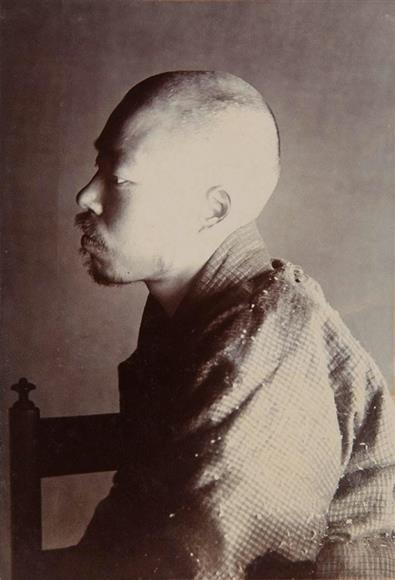
![]()
Shiki's last portrait, December 24, 1900. Photo: 正岡明 Masaoka Akira
![]()
子規の俳句
http://www.aozora.gr.jp/index_pages/person305.html#sakuhin_list_1
http://www5c.biglobe.ne.jp/n32e131/haiku/siki.html
http://etext.lib.virginia.edu/japanese/shiki/beichman/BeiShik.utf8.html
http://www.webmtabi.jp/200803/haiku/matsuyama_masaokashiki_index.html
https://www.city.matsuyama.ehime.jp/shisetsu/bunka/sikihaku/sikihakuriyou/shikihaiku_kensaku.html
子規は、その長くはない生涯で約24,000もの俳句を作りました。(抹消句等を含みます)
その子規の俳句を、春、夏、秋、冬、新年、雑 に分類して掲載しました。
季語での検索もできますので、ぜひ覗いてみてください。出典:『季語別子規俳句集』 編集・発行 松山市立子規記念博物館
年代 Date 季節 Season 分類 Classification (plants, animals, human, astronomy etc.) 季語 Kigo (seasonal word)
子規の俳句検索
http://sikihaku.lesp.co.jp/community/search/index.php
指定管理者株式会社(レスパスコーポレーション)のホームページで、句中曖昧語、年代、季節、分類、季語の5つの検索方法で絞り込んで検索できるようになりましたので、こちらもご利用ください。
![]()
Biography
1867:
Born in Matsuyama Castle Town (present Matsuyama-city) on September 17.
1883:
Went to Tokyo where his uncle lived.
1884:
Entered Tokyo University Preparatory School.
1888:
Entered the Tokiwa Kai Dormitory of the Matsuyama Domain, Hisamatsu Clan. Expectorated blood for the first time.
1889:
Expectoration of blood lasted for a week. Began calling himself" Shiki ".
1890:
Entered into the Philosophy Department of The College of Liberal Arts of Imperial University, and later transfered to the Japanese Literature Department.
1892 :
Wrote travel writings and stories about haiku in the newspaper, Nihon. Contracted tuberculosis.
1893:
Withdrew from the university.
1895:
Traveled to Kinshu, Qing as a war correspondent in the Sino-Japanese War. On his way back to Japan, spit up blood and returned to Matsuyama for recuperation. Stayed in the lodging, Gudabutsu An, where a Matsuyama East High School Teacher, Natsume Soseki (later to be a famous author in his own right) was also staying, and started his reform of haiku with members of Shofu Kai.
1896:
The tuberculosis was complicated by spinal caries.
1897:
Became involved in publishing the haiku magazine, Hototogisu (Cuckoo) in Matsuyama.
1898:
Wrote Utayomi ni Atauru Sho (Book for poets), advocating the necessity of reforming Tanka. Held poetry study meetings on the poetry anthology, The Anthology of Myriad Leaves.
1900:
Held a writing study group, Yamakai, advocating " Shaseibun (highly descriptire writing style)".
1902:
Died on September 19 at 36 years old. Laid to rest at Dairyiiji Temple in Kita-ku, Tokyo.
SHIKI: The Discovery
of Haiku
Source:
http://shiki.toward.co.jp/~kim/masaoka1.html
In
1868 Japan launched into a civilized society from the feudal age. Western culture
had a great effect on it and civilization rapidly developed modern culture.
In the previous year 1867, Masaoka Shiki was born in Matsuyama. His father served
the Matsuyama domain in the lower rank of samurai. Shiki lived to be 35 years
old and died of tuberculosis of spine in 1902. In his last seven years, he had
to be confined to his bed; however, during that time he accomplished three of
his great works on modern literature: Haiku Reform, Tanka reform, Advocating Sketch-from-Life-Prose.
1. Shiki's Discovery of Literature
When Shiki was in the fifth grade he composed a Chinese poem.
聞子規
一声弧月下 啼血不堪聞
半夜空欹枕 故郷万里雲
Under the moonlight, cuckoo cried as if it coughed up blood.
The sad voice kept me waking up,
the cry reminded me of my old home town far away.
(It is said that a Japanese cuckoo, hototogisu, 子規 (Shiki) will sing until it coughs out blood because of its sad voice.)
In those days Chinese poetry and prose were considered as important learning and culture, so even young children used to compose them. The interesting thing about this young Shiki's Chinese poem is that he composed on a sad voice of cuckoo which would cough up blood. Later he was to cough out blood and he picked out his pen name, 子規 (Shiki) a hototogisu. Shiki wrote about 900 Chinese poems in his life.
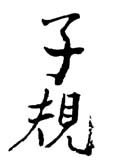 Shiki's name in his own handwriting
Shiki's name in his own handwriting
At the age of 15, Shiki began to composed tanka with 31 Japanese letters of 5-7-5-7-7 syllables. He composed about 2300 tanka in his life.
2. Interest in Haiku
野のみどり搗き込みにけり草の餅
green in the field
was pounded into
rice cake
草餅 a green herb rice cake is made of rice pounded in a mortar with steamed leaves of mugworts. The expression ' green in the field is pound into rice cake' was interesting, but overuses the images.
When he was 22, he coughed out blood. He changed his name to Shiki,which is an another name for the bird a Japanese cuckoo 'hototogisu'. Since those days, he was inspired by his uncle, haiku teacher Ohara Kiju. He began to devote himself into haiku. Shiki composed over 25,500 haiku in his short life. After Ohara Kiju passed away, he began to classify old haiku according to season words. At that time there were several ways of using season words and they were different according to writers. For instance, there were many kinds of 'tofu' : cold tofu, yu-dofu (a simmered hot water tofu), etc. So he began to consider what season each word should express.
3. Haiku as a Sketch of Life
When he was 24, he had 3 day walk around Musashino ( fields around present Warabi-shi and Kumagawa-shi in Saitama Prefecture where there used to be lots of rice paddy fields and forests.) at the end of the year 1891, when he realized that word play would not enough to express the truth and that we should write things as they are. He had an open-eye to haiku for the first time. He composed:
凩や荒緒くひこむ菅の笠
cold winter blast
a cord of a sedge hat
cut into my neck夕日負ふ六部背高き枯野かな
the sun set behind
a traveling monk
tall in the withered field
Next year in 1892 he went to a hill ,Takao-san in the western suburbs of Tokyo and composed the following haiku:
麦蒔や束ねあげたる桑の枝
wheat sowing
the mulberry trees
lift bunched branches松杉や枯野の中の不動堂
pine and cypress
in a desolate filed
a Fudodo shrine
He wrote a simple haiku from a simple common sight. This was a new experiment and discovery of new material and vision. Then he composed another sketch haiku in 1894.
低く飛ぶ畦の螽や日の弱り
locusts fly low
over rice paddies
in the dim sun ray赤蜻蛉筑波に雲もなかりけり
red dragon fly
in the sky of Tsukuba
no cloud
The former haiku has a very close eye to the insects and the latter one expresses a very spacy field with a dragon fly focused.
4. Shiki in Matsuyama
At the age of 28 he returned to Matsuyama and spent over 50 days recuperating from tuberculosis with Soseki Natsume, one of his best friends and a very famous author. Soseki was in Matsuyama as a teacher of English at Matsuyama Middle School. Soseki was living at Gudabutsuan, where many Shiki's friends visited. Soseki and town people were quite inspired with Shiki's new type haiku. They gathered around him every night to hold haiku meetings. They also enjoyed writing haiku while taking a walk. Shiki composed this haiku when they paid a visit to Ishite Temple, the 51st pilgrimage temple.
見上ぐれば塔の高さよ秋の空 composed on September 20 in 1895.
looking up
what a high pagoda
in the autumn sky
This haiku just has a right direct expression of the great three storied pagoda, soaring to the clear autumn sky.
At Hojoji Temple,where Buddhism Ji-sect founder Saint Ippen was born, he composed:
色里や十歩はなれて秋の空
a gay quarter
just ten steps away
autumn breeze
Just near the temple there used to be a gay quarter.
Also he composed another haiku at Dogo Hot Spring from the building of Dogo hot spring spa, which is very near the temple.
柿の木にとりかこまれたる温泉哉
by persimmon trees
surrounded
hot spring
From the 3rd floor of the main building of Dogo hot spring spa, we see the castle to the west, rice paddies beyond and hot spring quarters, where each house had persimmon trees in the yard. They were astringent persimmons. We remove the astringency of persimmons with low-class distilled spirits, 'shochu'. We spray 'shochu' over them until they become sweet, Shiki loved this sweetened persimmons very much. As for his haiku appreciation, that haiku describes only visible scene, and to tell the truth, we may say it is not so good a haiku. Shiki could have eaten up 15 or 16 of the sweetened persimmons at one time. So persimmon trees might have attracted Shiki.
5. Haiku Reform
Through his haiku exercise, he studied how to improve haiku and wrote a theoretical text on haiku literature, 'Haiku Taiyo', The Element of Haiku.
At this time haiku was considered to be a low rank literature. It used to be composed in the hangout of the barbers or rikisha-men. But Shiki's 'Haiku Taiyo' inspired people and they began to think better of haiku.
Shiki composed more haiku:
水草の花まだ白し秋の風
water plant blossoms
still white
autumn windひょっと葉は牛が喰ふたか曼珠沙華
I wonder
a cow has eaten up the leaves
a spider lily松山の城をのせたり稲むしろ
Matsuyama Castle
lifted over the mats
of rice fields
In the traditional Japanese literature, people used to attach much importance to 'yugen' and 'wabi'. 'Yugen' is the subtle and profound quiet beauty and 'wabi' is quiet refinement. These concepts are based on imagination. But Shiki made much use of realism as a methodology and also hit upon an idea of sketch, a technique of drawing and then proposed the philosopher Hegel's theory of "Aufheben", Sublimation as a true literature. He thought of how to use the selection of combination with realism. He advocated 'the 3rd literature; Non imaginary and non realistic literature'.
On his way to Tokyo, he dropped in at Nara, and composed the best known haiku.
柿食へば鐘が鳴るなり法隆寺
I bite a persimmon
the bell tolls
Horyu-ji Templewhenever I bite a persimmon a bell tolls Hōryū-ji Temple
the temple bell rings
(version by Debra Woolard Bender )
as I eat a persimmon--
Hōryū-ji
(version by Paul Conneally )
taste of persimmon
as sharp as the bells
Hōryū-ji
(version by Laurene Post)
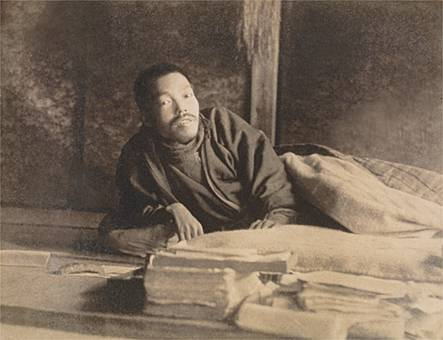
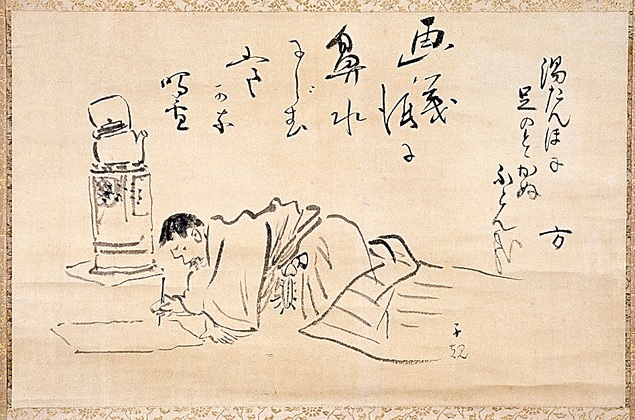
Sick in bed, drawing by Shiki
Shortly after, he suffered much agonized pain and had to be confined to his sick bed for seven years. Although he was a newspaper correspondent at Nihon Shinbun newspaper company, he could not get to work. During that painful period in bed, he initiated his haiku and tanka reform.
6. Some Interesting Haiku
Let's appreciate some of his interesting haiku:
猫恋 (in 1896)
内のチョマが隣のタマを待つ夜かな
Title: Cat's Love
My cat Choma
waiting for neighbor's cat Tama
at night.
This haiku is humorous and it contains the real cats' names 'Choma' and 'Tama'.
いくたびも雪の深さを尋ねけり
many a time
asking the height of
the snow
Since there was not so much snow in Matsuyama, Shiki might have been interested in the snow and he was curious about snow like a child. He kept such innocent spirit of a child.
幼子や青きを踏みし足の裏 (in 1898)
an infant
steps on the green grass
barefoot
This green grass haiku evokes us of the touch of the child's barefoot on the green grass.
この頃の蕣藍に定まりぬ
at this time
morning glories fix the color
deep blue
The summer is advancing and the color of the morning glories has become most blue.
林檎くふて牡丹の前に死なん哉
I eat green apples
facing to peonies
I will die
In this peony haiku, both 'green apples' and 'peony' are summer season words. It is usually said we should not use two season words because the haiku will be out of focus with two images. But this haiku is beautiful and it describes Shiki's character very well. Shiki liked fruit very much. When he wrote the haiku, he had eaten apples to his heart content, thinking of the famous traditional haiku master Buson, who composed famous beautiful haiku on peonies. Also Shiki believed Buson was the greatest haiku poet that people should follow his way.
Shiki's characteristic realism is not such realism as observing things merely objectively but a value of realism appreciating the objects profoundly and reaching a mental state of accepting just as they are, a state of simplicity.
7. Shiki's Curiosity and Humor
At the age of 34, his friend bought a new record player and they listened to Western Laughing Songs. In no time Shiki composed a humorous poem.
crows come flying
scatter their dropping
on a man Gonbe, on the head,
a-ha-ha! a-ha-ha! a-ha-ha! . . . . . . . (in 1901)
In spite of his pain, he still seems to have had such sense of humor. Everyday he had high fever. He was thirsty. Then he composed:
春深く腐りし蜜柑好みけり (in 1901)
full of spring
rotten oranges
how sweet!
He still devoted himself to eating fruit. Writing and eating were only his pleasure in his sick bed. He submitted his article to the newspaper every day.
He was tortured by pain, but when morphine could mask the main, he enjoyed painting.
While the death is closing to Shiki, he composed a haiku on a cicada.
ツクツクボーシツクツクボーシバカリナリ
a late summer cicada
at the top of his voice
chirping, and chirping . . . . . . .
The image of the life of the cicada overlaps his fate close to death.
8. Deathbed Haiku
On the morning of September, with the assistance of Hekigoto, one of his successor who was nursing him and his sister Ritsu, he wrote down three final haiku.
糸瓜咲いて痰のつまりし仏かな
sponge gourd has bloomed
choked by phlegm
a departed soul
Sponge gourd vine juice was used to relieve coughing, but it could no longer help Shiki. Death came at one o'clock the following morning. Even sponge gourd, which is not so elegant, became the theme of his haiku. He found the poetic taste in it and took himself for a hotoke buddha (a departed soul).
----------- based on a talk given by Prof. Shigeki Wada, former curator of the Shiki Memorial Museum, for the EPIC 'Hand's On' project.
----------------------------------------------------------
Two Portraits of Shiki by 中村不折 Nakamura Fusetsu (1866-1943)
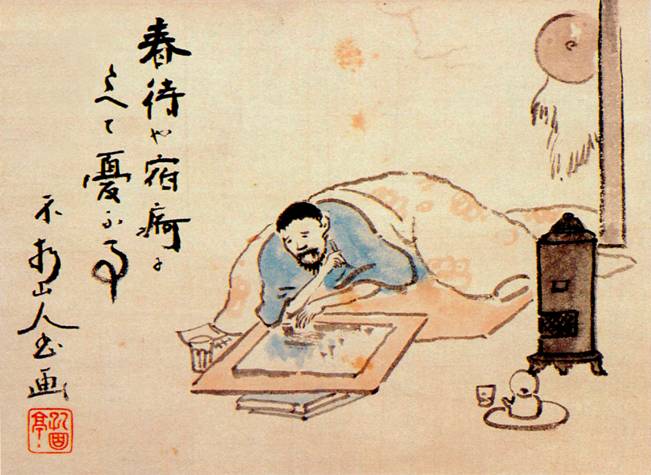
「病床の子規」
Shiki in sickbed
Shiki's Last Writing
http://www.cc.matsuyama-u.ac.jp/~shiki/kim/newlast3haiku.htmlBecause of a debilitating disease Masaoka Shiki had to be confined to his bed for almost 7 years until he passed away. Despite the pain, he continued writing poems while lying on his back. When Shiki came near to death, one of his disciples, Hekigoto was at Shiki's bedside. Hekigoto wrote about how Shiki wrote his final three haiku as follows.
It was around 10 o'clock on the morning of September 18.
I dipped his old writing brush, whose stem and brush were both thin, full of ink and had him hold it in his right hand.
Then quite abruptly in the center of the paper Shiki began to write readily "sponge gourd has bloomed ", and a little below that phrase, he again moved his brush in a breath "choked by phlegm"
I was a little curious what he was going to write next and was watching the paper closely, then at last he wrote "a departed soul", which bit into my heart.
Hekigoto was very touched when Shiki began to write the poem. Shiki was so weak, and desperately coughing, but he still had a determination to write these haiku.
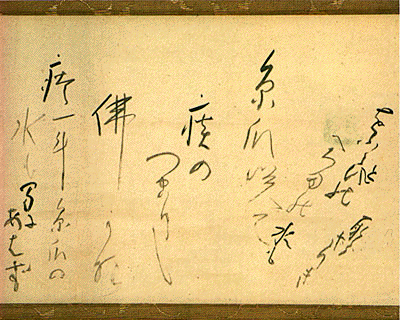
The three death haiku poems by Shiki written by his own hand about 13 to 14 hours before his death which occurred around 1 a.m. 19 September 1902.
The one in the centre in the largest letters and in four lines is the first poem he wrote:
糸瓜咲て痰のつまりし佛かな
hechima saite tan no tsumarishi hotoke kanathe gourd flowers bloom,
but look—here lies
a phlegm-stuffed Buddha!sponge gourd has bloomed
choked by phlegm
a departed soulsnake gourd has gone to flower
a Buddha have I turned
choked with phlegmWhen the loofah bloomed
He choked on phlegm
And died.The luffa flowered.
I am a soul
Choked with phlegm.The snake gourd blossoms.
My throat blocked with phlegm,
I am already a Buddha.Dishcloth gourd came into flower
I'm going to die
sticking phlegm in my throatThe sponge gourd has flowered!
Look at the Buddha
Choked with phlegm.The loofah blooms and
I, full of phlegm,
become a Buddha.sponge gourds in bloom
this hotoke*
choked by phlegm
*Hotoke is a word for Buddha. It is also used to refer to a person who has died.
Der Schwammkürbis blüht.
Vom Schleim wird langsam erstickt
ein neuer Buddha.
The second verse was written within the small space to the left of the first:
痰一斗糸瓜の水も間にあはず
tan itto hechima no mizu mo ma ni awazua quart of phlegm—
even gourd water
couldn't mop it upgallons of phlegm
even the gourd water
couldn't clear it upa barrel of phlegm
snake gourd water is
just not enoughNo matter how I get the water of dishcloth gourd
It's not enough to clear a large quantity of phlegm
amount to about 12 litergallons of phlegm
too late
even for sponge gourd juiceA barrelful of phlegm—
even loofah water
will not avail me now.Ein Klumpen Auswurf.
Der Saft des Schwammkürbises
konnte nicht helfen.
The third and last poem is on the right hand space and written diagonally:
をととひのへちまの水も取らざりき
ototoi no hechima no mizu mo torazarikithey didn't gather
gourd water
day before yesterday eitherthe gourd water
of the night before yesterday
they didn't get it eithersince the day before yesterday
not even snake gourd water
has been collectedI didn't gather the water of dishcloth gourd
on the day before yesterday (15th Sept. of lunar calendar)
which is good for clearing phlegmthe sponge gourd juice
of two days ago
wasn't even takenLoofah water
from two days ago
left still untouched.Sie ernteten nicht
den Saft des Schwammkürbises,
obwohl Vollmond war.
It is said that fluid taken from a sponge gourd stem is effective in relieving coughing. The night before there was a full-moon The fluid collected on a full moon night was believed to be the best to clear phlegm up. Since Shiki was really dying, Shiki's family may have been too discouraged to collect fluid on the full-moon night. One of his friends described that Shiki looked like a living mummy. On the next day of his 35th birthday he fell into a coma and then on the 19th his life came to end, while sponge gourd blossoms were in bloom in his garden. We call the anniversary of Shiki's death "anniversary of sponge gourd.
Kimiyo Tanaka
-------------------------------------------
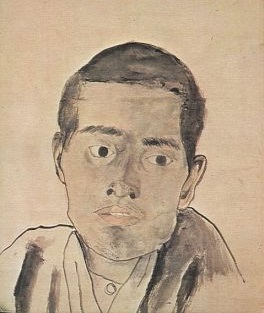
Self-portrait painted by Shiki in water colors in 1900The Japanese haiku poet Masaoka Shiki (1867-1902) died of tuberculosis at thirty-five. In his final days he suffered unbearable pain caused by spinal decay. He couldn't even shift in his bed. About three months before his death, he wrote in an essay for a newspaper: “Until now, I have misunderstood satori in Zen. I mistakenly thought that satori was to die with peace of mind in any condition. Satori is to live with peace of mind in any condition.”
In A Sixfoot Sickbed for June 2, 1902, he wrote, Until now I had mistaken the “Enlightenment” of Zen: I was wrong to think it meant being able to die serenely under any conditions. It means beign able to live serenely under any conditions. (XI, 261)
[Masaoka Shiki: His Life and Works by Janine Beichman, p. 129.]In spite of ill health, Shiki maintained a prominent position in the literary world, and his views on poetry and aesthetics, as well as his own poems, appeared regularly in print. Masaoka frequently mentioned his illness in his poems and in such essays as “Byōshō rokushaku” (1902; “The Six-foot Sickbed”), but maintained an emotional detachment from his physical suffering. During the last years of his life, Masaoka was a bed-ridden invalid, but his home became a meeting place for his friends and followers, who gathered there to discuss literature. Masaoka Shiki died in Tokyo on September 9, 1902, a few weeks before his thirty-fifth birthday.
“Until now, I had misunderstood the Satori, enlightenment of Zen Buddhism. I had thought that satori is to die without fear anytime. But it is a wrong guess. The satori is to live unconcernedly anytime.”One of his infrequent references to Zen is found in the June 2, 1902, entry in Byōshō rokushaku:
“Up to now I have always misunderstood the satori of Zen. I mistakenly supposed that satori was a way to dying tranquilly, regardless of the circumstances, but satori is actually how to live tranquilly, regardless of the circumstances.” In Shiki zenshū 11:261.
[The Winter Sun Shines in: A Life of Masaoka Shiki by Donald Keene]-------------------------------------------
The Poetry of Shiki
On how to sing
the frog school and the skylark school
are arguing.
A
spring day
A long line of footprints
On the sandy beach.
Double
cherry blossoms
Flutter in the wind
One petal after another.
At the gate
Under the oak the shoots
So luxuriant.
Oppressive
heat --
My whirling mind
Listens to the peals of thunder.
The
wild geese take flight
Low along the railroad tracks
In the moonlight
night
-------------------------------------------
I
can see the stones
On the bottom fluctuate
Through the clear water.
Frozen
in the ice
A maple leaf.
Shitting
in the winter turnip field
The distant lights of the city.
-------------------------------------------
the
pear blossoming...
after the battle this
ruined house
------------------------------------------
rowing through
out of the mist
the wide sea
------------------------------------------
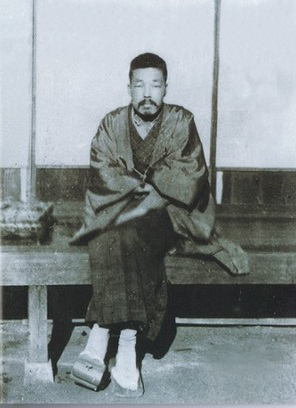
Shiki's portrait photo, December 24, 1897
Selected Poems of Masaoka Shiki, Translated by Janine Beichman
quote from the University of Virginia
Source: http://etext.lib.virginia.edu/japanese/shiki/beichman/BeiShik.utf8.htm
Poem numbers are not native to the original source but were derived from the page number and position of each poem in the Beichman edition.
For example, 50.2 refers to the second poem on page
50.16.1
水無月の虚空に涼し時鳥
minazuki no kokū ni suzushi hototogisu
In the coolness
of the empty sixth-month sky...
the cuckoo's cry.
48.1
木をつみて夜の明やすき小窓かな
ki o tsumite yo no akeyasuki komado kana
the tree cut,
dawn breaks early
at my little window
49.1
一重づゝ一重つゝ散れ八重櫻
hitoezutsu hitoezutsu chire yaezakura
scatter layer
by layer, eight-layered
cherry blossoms!
49.2
名月の出るやゆらめく花薄
meigetsu no deru ya yurameku hanasusuki
at the full moon's
rising, the silver-plumed
reeds tremble
50.1
ちる花にもつるゝ鳥の翼かな
chiru hana ni motsururu tori no tsubasa kana
entangled with
the scattering cherry blossoms—
the wings of birds!
50.2
麥蒔やたばねあげたる桑の枝
mugi maki ya tabane agetaru kuwa no eda
wheat sowing—
the mulberry trees
lift bunched branches
50.3
松杉や枯野の中の不動堂
matsu sugi ya kareno no naka no Fudōdō
pine and cypress:
in a withered field,
a shrine to Fudō
51.1
すゝしさや神と佛の隣同士
suzushisa ya kami to hotoke no tonaridoshi
in the coolness
gods and Buddhas
dwell as neighbors
51.2
御佛に尻むけ居れば月涼し
mihotoke ni shirimuke oreba tsuki suzushi
I turn my back
on Buddha and face
the cool moon
51.3
見下せば月にすゞしや四千軒
mioroseba tsuki ni suzushi ya yonsenken
looking down I see,
cool in the moonlight,
4000 houses
52.1
月涼し蛙の聲のわきあがる
tsuki suzushi kawazu no koe no wakiagaru
the moon is cool—
frogs' croaking
wells up
52.2
すゞしさや瀧ほとばしる家のあひ
suzushisa ya taki hotobashiru ie no ai
coolness—
a mountain stream splashes out
between houses
52.3
春風に尾をひろげたる孔雀かな
harukaze ni o o hirogetaru kujaku kana
fanning out its tail
in the spring breeze,
see—a peacock!
53.1
柿くへば鐘が鳴るなり法隆寺
kaki kueba kane ga narunari Hōryūji
I bite into a persimmon
and a bell resounds—
Hōryūji
57.1
稻の花道灌山の日和かな
ine no hana Dōkanyama no hiyori kana
rice flowers—
fair weather on
Dōkanyama
57.2
稻刈るや燒場の烟たゝぬ日に
ine karu ya yakiba no kemuri tatanu hi ni
rice reaping—
no smoke rising from
the cremation ground today
63.1
古庭や月に湯婆の湯をこぼす
furuniwa ya tsuki ni tanpo no yu o kobosu
old garden—she empties
a hot-water bottle
under the moon
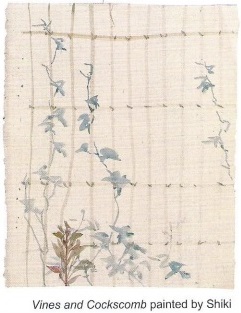
64.1 -
庭前
鷄頭の十四五本もありぬべし
"teizen"
keitō no jūshigohon mo arinubeshi
"Before the Garden"
cockscombs...
must be 14,
or 15
65.1
いくたびも雪の深さを尋ねけり
ikutabi mo yuki no fukasa o tazunekeri
again and again
I ask how high
the snow is
65.2
雪ふるよ障子の穴を見てあれば
yuki furu yo shōji no ana o mite areba
snow's falling!
I see it through a hole
in the shutter...
66.1
雪の家に寢て居ると思ふばかりにて
yuki no ie ni nete iru to omou bakari ni te
all I can think of
is being sick in bed
and snowbound...
66.2
障子明けよ上野の雪を一目見ん
shōji ake yo Ueno no yuki o hitome min
open the shutter!
I'll just have a look
at Ueno's snow!
69.1
春雨や傘さして見る繪草紙屋
harusame ya kasa sashite miru ezōshiya
spring rain:
browsing under an umbrella
at the picture-book store
69.2
榎の實散る此頃うとし鄰の子
e no mi chiru konogoro utoshi tonari no ko
the nettle nuts are falling...
the little girls next door
don't visit me these days
70.1
しぐるゝや蒟蒻冷えて臍の上
shigururu ya konnyaku hiete heso no ue
it's drizzling...
devil's tongue, cold on
my belly button
70.2
鬚剃るや上野の鐘の霞む日に
hige soru ya Ueno no kane no kasumu hi ni
getting a shave!
on a day when Ueno's bell
is blurred by haze...
71.1
臥病十年
首あげて折々見るや庭の萩
"Gabyō Jūnen"
kubi agete oriori miru ya niwa no hagi
"Sick in Bed Ten Years"
lifting my head,
I look now and then—
the garden clover
72.1
餘命いくばくかある夜短し
yomei ikubaku ka aru yo mijikashi
how much longer
is my life?
a brief night...
84.2
楊貴妃の寐起顏なる牡丹哉
Yōkihi no neokigao naru botan kana
the peony seems
to think itself Yōkihi
as she awakes
97.1
藤の花長うして雨ふらんとす
fuji no hana nagōshite ame furan to su
wisteria plumes
sweep the earth, and soon
the rains will fall
97.2
黒きまでに紫深き葡萄かな
kuroki made ni murasaki fukaki budō kana
purple unto
blackness:
grapes!
99.1
病牀の我に露ちる思ひあり
byōshō no ware ni tsuyu chiru omoi ari
I thought I felt
a dewdrop on me
as I lay in bed
100.1
紅梅の散りぬ淋しき枕元
kōbai no chirinu sabishiki makura moto
crimson plum blossoms
scattered over the loneliness
of the bed...
100.2
紅梅の落花をつまむ疊哉
kōbai no rakka o tsumamu tatami kana
fallen petals of
the crimson plum I pluck
from the tatami
102.2
絲瓜咲て痰のつまりし佛かな
hechima saite tan no tsumarishi hotoke kana
the gourd flowers bloom,
but look—here lies
a phlegm-stuffed Buddha!
103.1
痰一斗絲瓜の水も間に合はず
tan itto hechima no mizu mo ma ni awazu
a quart of phlegm—
even gourd water
couldn't mop it up
103.2
をとゝひのへちまの水も取らざりき
ototoi no hechima no mizu mo torazariki
they didn't gather
gourd water
day before yesterday either
113.1
ごて/\と草花植し小庭かな
gotegote to kusabana ueshi koniwa kana
a jumble of
flowers planted—
see, the little garden!
134.1
絲瓜さへ佛になるぞ後るゝな
hechima sae hotoke ni naru zo okururu na
hey!—even snake gourds
become Buddhas—
don't get caught behind!
134.2
成佛ヤ夕顏ノ顔ヘチマノ屁
jōbutsu ya yūgao no kao hechima no he
Buddha-death:
the moonflower's face,
the snake gourd's fart
136.1
病牀の財布も秋の錦かな
byōshō no saifu mo aki no nishiki kana
the wallet
by the bed is my
autumn brocade
136.2
栗飯ヤ病人ナガラ大食ヒ
kurimeshi ya byōnin nagara ōkurai
chestnut rice—
though a sick man,
still a glutton
136.3
カブリツク熟柿ヤ髯ヲ汚シケリ
kaburitsuku jukushi ya hige o yogoshikeri
I sink my teeth
into a ripe persimmon—
it dribbles down my beard
136.4
驚くや夕顏落ちし夜半の音
odoroku ya yūgao ochishi yowa no oto
surprise!
a moonflower fell—
midnight sound
-------------------------------------------
http://members.aol.com/markabird/shiki.html
The desolation of winter;
passing through a small hamlet,
a dog barks.
Evening
snow falling,
a pair of mandarin ducks
on an ancient lake.
Now
and again
it turns to hail;
the wind is strong.
With
a bull on board,
the ferry boat,
through the winter rain.
A
stray cat
excreting
in the winter garden.
Only
the gate
of the abbey is left,
on the winter moor.
------------------------------------------
柿くへば鐘が鳴るなり法隆寺
kaki kueba kane ga naru nari hōryūji
biting into a persimmon
a bell resounds
Hōryū-ji
いくたびも雪の深さを尋ねけり
ikutabi mo yuki no fukasa o tazune keri
again and again
I asked the depth
of the snow
雪ふりや棟の白猫聲はかり
yukifuri ya mune no shironeko koe bakari
snow –
white cat on the roof ridge
just its voice
雑煮くふてよき初 夢を忘れけり
zōni kūte yoki hatsuyume o wasure keri
having eaten zōni
I forgot my good dream
of the New Year
春や昔十五万石の城下哉
haru ya mukashi jūgoman goku no jōka kana
grand castle town
of the past ―
spring
十年の汗を道後の温泉に洗へ
jūnen no ase o dōgo no yu ni arae
wash away
those 10 years of sweat
Dōgo hot spring
夏草やベースボールの人遠し
natsukusa ya bēsu bōru no hito tōshi
summer grass
the baseball players
so far away
桔梗活けてしばらく仮の書斎かな
kikyō ikete shibaraku kari no shosai kana
arranging bellflowers
this will be my study
for the time being
putting bellflowers in a vase
this is my study
for the time being
-------------------------------------------
aiming
at
deutzia blossoms
little cuckoo
spring
breeze
show off the castle
above the pine tree
-------------------------------------------
By
the ruined mansion,
Fowls roaming
Among the hibiscus
The
dead body
Of a trodden-on crab,
This autumn morning
Fallen
leaves
Come flying from elsewhere:
Autumn is ending.
Having
felled
A pasania tree,-
the sky of autumn.
-------------------------------------------
I
want to sleep
Swat the flies
Softly, please.
After
killing
a spider, how lonely I feel
in the cold of night!
For
love and for hate
I swat a fly and offer it
to an ant.
A
mountain village
under the pilled-up snow
the sound of water.
Night;
and once again,
the while I wait for you, cold wind
turns into rain.
The
summer river:
although there is a bridge, my horse
goes through the water.
A
lightning flash:
between the forest trees
I have seen water.
-------------------------------------------
Shiki Masaoka appeared in the haiku world as the critic to Basho Matsuo. Shiki criticized Basho's famous haikus in his criticism "Basho Zatsudan" (Miscellanies about Basho). He didn't deny Basho's all works, but he reproached his hokkus for lack of poetic purity and for having explanatory prosaic elements.
On the other hand, he extolled Buson Yosa who had been unrecognized yet. He thought that Buson's haikus are technically refined and they transmit efficiently clear impressions to readers.
After the discovery of the Western philosophy, Shiki convinced that laconic descriptions of things were effective for literary and pictorial expression. He insisted on the importance of "shasei" (写生 sketching). This idea led his haikus to the visual description and to the concise style.
The haiku innovation by Shiki created a great sensation in the whole of Japan and revived the languishing haiku world.
あたたかな雨が降るなり枯葎
The
tepid rain falls
On the bare thorn.
氷解けて古藻に動く小海老かな
Thawed out pond.
A shrimp moves
Among old algae.
大砲のどろどろと鳴る木の芽かな
The cannon rolls its rumble.
Leaf buds of a tree.
涼しさや松這ひ上る雨の蟹
How cool it is!
A small crab, in the rain,
Climbs on a pine.
蓮池の浮葉水こす五月雨
Lotus leaves in the pond
Ride on water.
Rain in June.
汽車過ぎて烟うづまく若葉かな
Smoke whirls
After the passage of a train.
Young foliage.
半日の嵐に折るる葵かな
The storm
During half-day
Has broken the stem of mallow.
月も見えず大きな波の立つことよ
We cannot see even the moon.
And rise big waves.
蔦さがる岩の凹みや堂一つ
Above a hollow of rock
An ivy hangs.
One small temple.
Shiki denied
the value of haikai-renga and always used the word "haiku" instead of
"haikai" or "hokku". Today, haikai-renga is called "renku",
but few specialists are interested in this poetic form.
-------------------------------------------
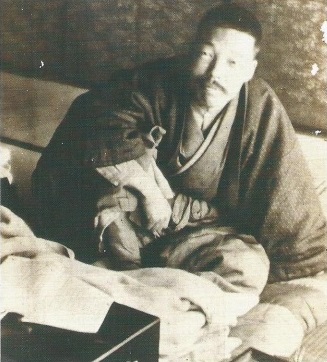
Shiki's photo (then
31-year-old)
Shiki's haiku
Tr. by Tanaka Kimiyo
http://www.cc.matsuyama-u.ac.jp/~shiki/kim/shikihaiku.html
http://web.archive.org/web/20161229235830/http://www.cc.matsuyama-u.ac.jp/~shiki/sm/sm.html
Spring
春の霜絲遊となって燃にけり
haru no shimo shiyuu to natte moenikeri
Spring frost
dancing in the air
a shimmer of heat鶏なくや小富士の麓桃の花
torinaku ya kofuji no fumoto momo no hana
a cock crows
at the foot of the small Mt. Fuji
peach blossoms故郷はいとこの多し桃の花
furusato wa itoko no ooshi momo no hana
my hometown
many cousins-
peach blossoms松の根に薄紫の菫かな
matsu no ne ni usumurasaki no sumire kana
at the root
of a pine tree
light lavender violet夕月や一かたまりに散る櫻
yuuzuki ya hitokatamari ni chiru sakura
moon at twilight,
a cluster of petals falling
from the cherry treeいちはつの一輪白し春の暮
ichiihatsu no ichirin shiroshi haru no kure
an iris
whiter at twilight
My hometownふるさとやどちらを見ても山笑ふ
furusato ya dorira o mitemo yama warau
My hometown
wherever I look
mountains laugh with vendure恋しらぬ猫や鶉を取らんとす
koi shiranu neko ya uzura o torantosu
a fancy-free cat
is about to catch
a quail春雨の土塀にとまる烏かな
harusame no dobei ni tomaru karasu kana
perching on a mud wall
in the spring rain
a crow春風や城あらわるゝ松の上
harukaze ya shiro arawaruru matsu no ue
spring breeze
show off the castle
above the pine tree春 の 山重なりあふて皆丸し
haru no yama kasanarioute mina marushi
Mountains in spring
overlapping each other
all round生壁に花吹きつけて春の風
namakabe ni hana fukitsukeru haru no kaze
cherry blossom petals
blown by the spring breeze
against the undried wallつゝじ咲く絶壁の凹み佛立つ
tsutsuji saku zeppeki no kubomi hotoke tatsu
blooming azaleas
in a hollow on a cliff
a Buddha stands
Summer
卯の花をめかけてきたかほとゝぎす
unohana o megakete kitaka hototogisu
aiming at
deutzia blossoms
little cuckoo山々は萌黄浅黄やほと々ぎす
yamayama wa moegi asagi ya hototogisu
Mountains are
yellow green, pale yellow-
a cuckoo cries城山の浮かみ上がるや青嵐
shiroyama no ukami agaru ya aoarashi
castle hill
high above
breezy green門さきにうつむきあふや百合の花
kadosaki ni utsumukiau ya yuri no hana
at the front gate
dropping their heads
lilies blooming草茂みベースボールの道白し
kusa shigemi besuboru no michi shiroshi
through a growth of weeds
runs an open path
baseball diamond五女ありて後の男や初幟
gojo arite nochi no otoko ya hatsunobori
It's a boy
after five daughters
carp streamers二筋に虹の立ったる青田哉
futasuji ni niji no tattaru aota kana
two rainbows
have risen over
the green paddy field静かさに蛍飛ぶなり淵の上
shizukasa ni hotaru tobunari fuchi no ue
stillness - -
fireflies are glowing over
deep water夏嵐机上の白紙飛びつくす
natsuarashi kijo no hakushi tobitsukusu
summer storm
white paper on the desk
all flies awayIn Japan summer storm can be described as a green wind,
because all trees in summer are full of green leaves.
In this haiku, the color contrast of green and white paper
gives a very sharp and clear and refreshing feeling.君を送りて思ふことあり蚊帳に泣く
kimi o okurite omou koto ari kaya ni naku
leaving me
something on my chest
tears on my mosquito net余命いくばくかある夜短し
yomei ikubaku ka aru yoru mijikashi
my remaining days
are numbered
a brief night薔薇を剪る鋏刀の音や五月晴
bara o kiru hasami no oto ya satsukibare
pruning a rose
sound of the scissors
on a bright May day赤薔薇や萌黄の蜘蛛の這ふて居る
akabara ya moegi no kumo no hohteiru
a yellow green spider
crawling on
a red rose蝸牛や雨雲さそふ角のさき
dedemushi ya amagumo sasou tsuno no saki
a snail
luring rain clouds
with feeler tipsふるさとや親すこやかに鮓の味
furusato ya oya sukoyakani sushi no aji
my hometown
parents are well
taste of sushi世の中の重荷おろして昼寝かな
yononaka no omoni oroshite hirune kana
relieved of a burden
in the everyday life
an afternoon nap伸び切って夏至に逢ふたる葵かな
nobikitte geshi ni ohtaru aoi kana
a hollyhock
shot up to meet
the summer solstice夏山や萬象青く橋赤し
natsuyama ya bansho aoku hashi akashi
summer mountain
all creatures are green
a red bridge鳴きやめて飛ぶ時蝉の身ゆるなり
nakiyamete tobutoki semi no miyuru nari
The singing stopped
a flying cicada
I saw it!淋しさや花火のあとの星の飛ぶ
sabishisa ya hanabi no ato no hoshi no tobu
loneliness
after the fireworks
stars' shooting夕風や白薔薇の花皆動く
yukaze ya shirobara no hana mina ugoku
an evening breeze
white rose petals are
all ruggled一匙のアイスクリムや蘇る
hitosaji no aisukurimu ya yomigaeru
one spoonful
of ice cream brings me
back to life蓼噛んでひとりこらえる思ひ哉
tade kande hitori koraeru omoikana
biting into a bitter weed
alone I bear
my feelings十年の汗を道後の温泉に洗へ
junen no ase o DOGO no yu ni arae
ten year's sweat
washed away
back at Dogo Onsen暮れきらぬ白帆に白き夏の月
kurekiranu shiraho ni shiroshi natsu no tsuki
at nightfall
a summer moon, white --
on the white sail紫陽花の雨に浅黄に月に青し
ajisai no ame ni asagi ni tsuki ni aoshi
hydrangeas
pale blue in the rain
blue in the moonlight紫陽花や壁のくづれをしぶく雨
ajisai ya kabe no kuzure o shibuku ame
hydrangeas ---
rain splashing upon
the crumbling walls古池やさかさに浮かふ蝉のから
furuike ya sakasa ni ukabu semi no kara
an old pond-
floating upside down
a cicada's shell
Autumn
低く飛ぶ畦のいなごや日の弱り
hikuku tobu aze no inago ya hi no yowari
Locusts fly low
over the levee
in the fading sunshine秋風や生きて会ひ見る汝れと我
akikaze ya ikite aimiru nare to ware
Autumn wind -
met, returning alive
you and me松山や秋より高き天守閣
Matsuyama ya akiyori takaki tenshukaku
Matsuyama castle
the keep is higher than
the autumn sky雲走り雲追ふ二百十日かな
kumo hashiri kumo ou nihyakutoka kana
clouds're running past
running after clouds
the Storm Day秋風や生きてあひ見る汝れと我
akikaze ya ikite aimiru nare to ware
autumn wind -
met, returning alive
you and me行く秋や手を引き合ひし松二木
yukuaki ya te o hikiaishi matsu futaki
autumn is leaving
tugging each others' branches
two pine trees野分の夜書読む心定まらず
nowaki no yo fumi yomu kokoro sadamarazu
on a stormy night
while reading a letter
wavering mind黒きまでに紫深き葡萄かな
kuroki madeni murasaki fukashi budo kana
almost black
deepening purple
ripe grapes行く秋の我に神無し仏なし
yukuaki no ware ni kami nashi hotoke nashi
with advancing autumn
I am without gods
without Buddha行く我にとヾまる汝に秋二つ
yuku ware ni todomaru nare ni aki futatsu
I am going
you're staying
two autumns for us身の上や御籤をひけば秋の風
minoue ya mikuji o hikeba aki no kaze
my fate,
a fortune tells
- autumn wind梨むくや甘き雫の刃を垂るゝ
nashimuku ya amaki shizuku no ha o taruru
peeling a pear
sweet drops dripping
along the knife edge故郷や祭りも過ぎて柿の味
furusato ya matsuri mo sugite kaki no aji
hometown -
festivals are over
flavorful persimmonsともし火の見えて紅葉の奥深し
tomoshibi no miete momiji no oku fukashi
lights
far way, through
leaves of dense autumnal tints名月に思ふことあり我一人
meigetsu ni omoukoto ari warehitori
the bright moon
something in my breast
I am alone名月に飛び行く雲の行方かな
meigetsu ni tobiyuku kumo no yukue kana
the bright moon
I wonder where the clouds
are flying off to引き裂いた雲のあとなり秋の風
hikisaita kumo no atonari aki no kaze
following
clouds torn apart
autumn wind朝寒や紫の雲消えて行く
asasamu ya murasaki no kumo kieteyuku
morning coolness
purple clouds are
vanishing山城に残る夕日や稲の花
yamashiro ni nokoru yuhi ya ine no hana
the setting sun
remains on the mountain
castle flowering rice雲はあれど彼岸の入り日赤かりし
kumo wa aredo higan no irihi akakarishi
crimson sunset
even through clouds
vernal equinox三千の俳句を閲し柿二つ
sanzen no haiku o kemishi kaki futatsu
looking through
three thousand haiku eating
two persimmons鐘の音の輪をなして来る夜長かな
kane no ne no wa o nashite kuru yonaga kana
sounds of a temple bell
reverberate in a circle
a long night犬の声靴の音ながき夜なりにけり
inu no koe kutsu no ne nagakiyo narini keri
a dog howling
sound of footsteps
longer nights
Winter and New Year's
二つ三つ石ころげたる枯野かな
futatsu mitsu ishi korogetaru kareno kana
two or three rocks
strewn about
dried up field寒椿黒き佛に手向けばや
kantsubaki furuki hotoke ni tamukabaya
winter camellia
I wish I could offer it
to the sooty Buddha松山の城を見おろす寒さかな
Matsuyama no shiro o miorosu samusa kana
coldness
looking down from above
Matsuyama Castle薪をわるいもうと一人冬籠
maki o waru imouto hitori fuyugomori
splitting wood
my sister alone -
wintering冬木立のうしろに赤き入り日かな
fuyukodachi no ushiro ni akaki irihikana
behind the stand
of winter trees
a red sunset門前のすぐに坂なり冬木立
monnzen no sugu ni saka nari fuyu-kodachi
just outside the gate
the road slopes downward
winter trees寒けれど酒もあり温泉もある処
samukeredo sake mo ari yu mo aru tokoro
It is cold, but
we have sake
and the hot spring* * *
梅提げて新年の御慶申しけり
ume sagete shinnen no gyokei moshikeri
New Year's greetings
with a plum branch
in hand空近くあまりまばゆき初日哉
sora chikaku amari mabayuki hatsuhi kana
the sky draws near
such a bright sunrise
New Year's Day元日の人通りとはなりにけり
ganjitsu no hitodori towa narinikeri
New Year's Day
has come -
quiet streets一年は正月に一生は今に在り
ichinen wa shogatsu ni issho wa ima ni ari
The year begins
on New Year's day
our life is Now星消えてあとは五色の初霞
hoshi kiete ato wa goshiki no hatsugasumi
the stars vanished
and then --
five-colored New Year's mist
-------------------------------------------
ちる花に仏とも法ともしらぬ哉
chiru hana ni butsu tomo nori tomo shiranu kana
in scattering blossoms
Buddha and Buddhism
unknown
Facing away from me
Darning old tabi –
My wife.
Devotion to the Great Saint,
the temple of Ishite...
rice plants abloom.
(Alas my) fortune;
drawing divine lots,
the aurumn wind.
-------------------------------------------
SHIKI (1867-1902)
Translated by Lucien Stryk
- Extracts from CAGE OF FIREFLIES, published by Swallow Press, 1993 -
White butterfly
darting among pinks -
whose spirit?
Indian summer:
dragonfly shadows seldom
brush the window.
Aged nightingale -
how sweet
the cuckoo's cry.
Wicker chair
in pinetree's shade,
forsaken.
Stone
on summer plain -
world's seat.
Summer sky
clear after rain -
ants on parade
Imagine -
the monk took off
before the moon shone.
Thing long forgotten -
pot where a flower blooms,
this spring day
------------------------------------------
Haiku Monuments of Masaoka Shiki
--------------------------------------------------------
References
Addiss, Stephen, Old Taoist - the life, art, and poetry of Kodojin,
Beichman, Janine, Masaoka Shiki, previously published by Twayne Publishers in 1982, first paperback edition, Kodansha International, Tokyo, 1986
Beichman-Yamamoto, Janine, Masaoka Shiki's A Drop of Ink, Monumenta Nipponica XXX, 3, 1965
Blyth, R. H. Haiku, 4 vol., Hokuseido Press, Tokyo 1963-64
Brower, Robert H. , and Miner, Earl, Japanese Court Poetry, Stanford University Press, 1961
Brower, Robert H., Masaoka Shiki and tanka Reform, in Tradition and Modernization in Japanese Culture, ed. Donald H. Shively, Princeton University Press, 1971
Henderson, Harold, An Introduction to Haiku, Garden City, N.Y., Doubleday, 1958
Higginson, William J., with Penny Harter, The Haiku Handbook - How to Write, Share, and Teach Haiku, Kodansha International, 1985
Isaacson, Harold J. trans. & ed., Peonies Kana - Haiku by the Upasaka Shiki, George Allen & Unwin Ltd., London, First ed., 1973 (It was published by Theatre Arts Books, New York, 1972)
Keene, Donald, Shiki and Takuboku, in Landscapes and Portraits: Appreciations of Japanese Culture, Tokyo and Palo Alto, Kodansha International Ltd 1971
Keene, Donald, Dawn to the West - A History of Japanese Literature, vol. 4, Columbia University Press, New York, First published 1984
Kimata, Osamu, Shiki Masaoka: His Haiku and Tanka, Philosophical Studies of Japan, VIII, 1967, (compiled by Japanese National Commission for UNESCO and published by Nippon Gakujutsu Shinkokai)
Miner, Earl, The verse record of My Peonies, in Japanese Poetic Diaries, Berkeley and Los Angeles, University of California Press, 1969
Morris, Mark,"Buson and Shiki: Part One." Harvard Journal of Asiatic Studies 44, no. 2 (December 1984); "Buson and Shiki: Part Two." Harvard Journal of Asiatic Studies 45, no. 1 (June 1985)
Nippon Gakujutsu Shinkokai, Special Haiku Committee of Japanese Classics Translation Committee consisting of Aso Isoji et al., Haikai and Haiku, Tokyo, Nippon Gakujutsu Shinkokai, 1958
Rexroth, Kenneth, 100 More Poems from the Japanese
Ueda, Makoto, Modern Japanese Haiku: An Anthology, University of Tokyo Press, 1976
Watson, Burton, Masaoka Shiki - Selected Poems, Columbia University Press, 1997
Yasuda, Kenneth, The Japanese Haiku: Its Essential Nature, History and Possibilities in English
Rimer, J. Thomas and Morrell, Robert E., Guide to Japanese Poetry., Boston , G.K. Hall and co., 1975
http://fukiosho.org/archive/reference/International_Haiku_Convention_2000.pdf
http://www.haikuhut.com/JAPANANDTHEWEST:SHIKIANDMODERNISM.pdf
Masaoka Shiki: Making of the Myth of Haiku by YOKOTA-MURAKAMI Takayuki
http://publications.nichibun.ac.jp/region/d/NSH/series/kosh/1996-03-25-2/s001/s035/pdf/article.pdf
J. Keith Vincent, Masaoka Shiki and the Meaning of Illness
http://www.academia.edu/14477579/Masaoka_Shiki_and_the_Meaning_of_Illness
Masaoka Tsunenori — the Haiku Master Shiki
by Janice M Bostok
https://australianhaikusociety.org/2007/04/25/masaoka-tsunenori-the-haiku-master-shiki-2/
Analysis of the medical care of Masaoka Shiki, as seen in "Gyoga Manroku"
by
Nobuko SEKINAGA
http://ci.nii.ac.jp/els/110010059515.pdf?id=ART0010629034&type=pdf&lang=en&host=cinii&order_no=&ppv_type=&lang_sw=&no=1494104059&cp=
--------------------------------------------------------
128 haikus de Masaoka Shiki
Haikus de primavera
http://traducirjapon.blogspot.hu/2009/05/haikus-de-primavera_09.html
Trad. de Alberto Silva
元旦は是も非もなくて衆生なり
Gantan wa ze mo hi mo nakute shujō nari
El año se inaugura
¿Todos buenos?
¿Todos malos?
Todos seres humanos
女負ふて川渡りけり朧月
Onna ōte kawa watari keri oborozuki
A lomos de aquel hombre
la chica cruza el río,
bajo luces rasgadas
de luna
牛部屋の牛のうなりや朧月
Ushibeya no ushi no unari ya oborozuki
Muge la vaca
en el establo. Mientras, la luna
se echa un velo
あたゝかに白壁ならぶ入江哉
Atataka ni shirakabe narabu irie kana
En la ensenada,
filas de casas tibias,
paredes blancas
川に沿うて行けど橋なし日の永き
Kawa ni sōte yukedo hashi nashi hi no nagaki
Corriente abajo,
sin huella de algún puente
para este día
que no se acaba
汽車道にならんでありく日永哉
Kishamichi ni narande ariku hinaga kana
En fila india,
larga, marcha la jornada
sobre los rieles
百人の人夫土掘る日永哉
Hyakunin no ninpu tsuchi horu hinaga kana
Cava que te cava:
la fila de braceros
se alarga más que el día
舟と岸と話してゐる日永かな
Fune to kishi to hanashi shite iru hinaga kana
¡Largo día!
Una lancha conversa
con la orilla
大仏のうつらうつらと春日哉
Daibutsu no utsura-utsura to haruhi kana
El Gran Buda
se echa sus siestas
primaverales
砂浜に足跡長き春日かな
Sunahama ni ashiato nagaki haruhi kana
Largas huellas de pasos
en la playa de aquel largo
día templado
かへり見れば行きあひし人の霞みけり
Kaerimireba yukiaishi hito no kasumi keri
Fue darme vuelta
y el hombre que cruzaba
se hizo niebla
春雨や傘さして見る絵草紙屋
Harusame ya kasa sashite miru ezōshiya
Apenas llueve
Bajo el paragua, unos libros
(hago que leo)
陽炎や三千軒の家のあと
Kagerō ya sanzen-gen no ie no ato
(Presenciando un gran incendio en Tokyo)
Tres mil braseros
soplando aire caliente:
ciudad en llamas
春の野や何に人ゆき人かへる
Haru no no ya nani ni hito yuki hito kaeru
Gentes por el campo
en primavera: ¿adónde van?
¿de dónde vienen?
大仏の片肌の雪解けにけり
Daibutsu no katahada no yuki toke ni keri
Nieve derretida:
le asoma un hombro
a Buda
さゝ波に解けたる池の氷かな
Sasanami ni toketaru ike no kōri kana
Olitas
descascaran
el hielo
de la charca
燈せば雛に影あり一つゞつ
Hitomoseba hina ni kage ari hitotsu-zutsu
Luz en la lumbre
Cada muñeca viste
su propia sombra
名所とも知らで畑うつ男かな
Meisho to mo shirade hata utsu otoko kana
Cava el buen hombre
No sabe
que es un lugar famoso
日一日同じ処に畠打つ
Hi ichi-nichi onaji tokoro ni hatake utsu
Un día entero,
cava que te cava
el mismo agujero
おそろしや石垣崩す猫の恋
Osoroshi ya ishigaki kuzusu neko no koi
Gatos calientes
(¡derriban muros
para poder amarse!)
雲をふみ霞を吸うやあげ雲雀
Kumo wo fumi kasumi wo sū ya age hibari
Roza las nubes
la alondra. Bebe niebla
(al fin remonta)
雲雀はと蛙はと歌の議論かな
Hibari wa to kaeru wa to uta no giron kana
Rivalidades:
¿el canto de la alondra
mejor que el de la rana?
ぬれ足で雀のありく廊下かな
Nureashi de suzume no ariku rōka kana
El gorrión a saltitos
por el porche
(tiene los pies mojados)
石に寝る蝶薄命の我を夢むらん
Ishi ni neru chō hakumei no ware wo yumemuran
Mariposa que duermes
sobre la piedra,
¿puedes soñar mi vida
corta y desierta?
よく見れば木瓜の莟や草の中
Yoku mireba boke no tsubomi ya kusa no naka
Puesto a mirar,
veo un capullo entre la hierba,
de magnolio
紫の夕山つじゝ家もなし
Murasaki no yūyama tsutsuji ie mo nashi
Las azaleas
entintan las montañas
abandonadas
del ocaso
柳あり舟待つ牛の二三匹
Yanagi ari fune matsu ushi no nisan-biki
Junto al sauce:
dos, tres vacas esperan
el servicio de balsa
舟と岸柳へだつる別れ哉
Fune to kishi yanagi hedatsuru wakare kana
Dos se despiden:
un sauce se entromete
entre el bote y la orilla
街中を小川流るる柳かな
Machinaka wo ogawa nagaruru yanagi kana
Por el poblado,
serpentea un arroyo
(igual los sauces)
菜の花や金蓮光る門徒寺
Nanohana ya kinren hikaru montodera
Flores de colza
Flores de berro
Ornato de los templos
カナリヤは逃げて春の日暮れにけり
Kanariya wa nigete haru no hi kure ni keri
Se escapó el canario,
como se esfuma un día más
de primavera
長閑さの独り行き独り面白き
Nodokasa no hitori yuki hitori omoshiroki
Calma
Solo vagabundear
Solo disfrutar
Haikus de verano
http://traducirjapon.blogspot.hu/2009/05/haikus-de-verano.html
Trad. de Alberto Silva
六月の海見ゆるなり寺の像
Roku-gatsu no umi miyuru nari tera no zō
El Buda del templo
apenas divisa
las olas lejanas de junio
短夜の灯火のこる港かな
Mijikayo no tomoshibi nokoru minato kana
La noche ya se muere
Quedan poquitas luces
en el puerto
余命いくばくかある夜短し
Waga inochi ikubaku ka aru yo mijikashi
La vida mía
La noche entera
¿Cuánta me queda todavía?
¡Tan pasajera!
涼しさや青田の中に一つ松
Suzushisa ya aota no naka ni hitotsu matsu
En un verde arrozal
la frescura
de aquel único pino
涼しさや石燈籠の穴の海
Suzushisa ya ishidōrō no ana no umi
¡Cómo refresca!: el mar
(lo miro por los huecos
de ese farol de piedra)
島あれば松あり風の音涼し
Shima areba matsu ari kaze no oto suzushi
Si hay isla, hay pino
Si hay pino, hay fresco
rumor de viento
大仏に腸のなき涼しさよ
Daibutsu ni harawata no naki suzushisa yo
Gran Buda
(de una frescura
sin entrañas)
暑くるし乱れ心や雷をきく
Atsukurushi midaregokoro ya rai wo kiku
Calor de infierno
Da vueltas mi cabeza
Restalla el trueno
鍬立ててあたり人なき暑さ哉
Kuwa tatete atari hito naki atsusa kana
La azada espera
Nadie a la vista
Sólo solana
海士が家に干魚の匂ふ暑さかな
Amagaya ni hizakana no niou atsusa kana
Casa de un pescador:
huele a pescado seco
y a calor
男ばかりの中に女の暑さかな
Otoko bakari no naka ni onna no atsusa kana
Presencia
de una mujer entre esos hombres:
¡qué calor!
帆の大き阿蘭陀船や雲の峰
Ho no ōki oranda-bune ya kumo no mine
El barco de gran vela
holandés coronado
de nubes se aleja
夏嵐机上の白紙飛び盡す
Natsuarashi kijō no hakushi tobi tsukusu
Vendaval de verano
Mis papeles se asustan
(salen volando)
一人居る編輯局や五月雨
Hitori iru henshūkyoku ya satsukiame
Solo en el diario
y afuera
llueve en mayo
夕立にうたるゝ鯉のあたまかな
Yūdachi ni utaruru koi no atama kana
Las gotas del chubasco
¡picotean la trompa
de las carpas!
炎天に菊を養ふあるじかな
Enten ni kiku wo yashinau aruji kana
Bajo un sol de justicia,
el amo que cultiva
crisantemos
夏川や馬つなぎたる橋柱
Natsukawa ya uma tsunagitaru hashi bashira
Caballo atado
del soporte del puente
del campo
del verano
夏川や橋あれど馬水を行く
Natsukawa ya hashi aredo uma mizu wo yuku
Un puente lo cruza,
pero al flete le gusta
vadearlo, a ese río,
en verano
金持も熊も来てのむ清水哉
Kanemochi mo kuma mo kite nomu shimizu kana
Igual que hacen los osos,
se sirven del manantial
los millonarios
大風の俄かに起る幟かな
Ōkaze no niwaka ni okoru nobori kana
Un fuerte viento
despertó de repente
la bandera de la fiesta
de los niños
人もなし子一人寝たる蚊帳の中
Hito mo nashi ko hitori netaru kaya no naka
Nadie a la vista
Salvo un bebé que duerme
en el mosquitero
二階から屋根船まねく團扇かな
Nikai kara yanebune maneku uchiwa kana
Con su abanico:
desde el primer piso
llama al barco
ふわふわとなき魂こゝに来て涼め
Fuwa-fuwa to naki tama koko ni kite suzume
Vengan a refrescarse,
espíritus flotantes,
sin pensárselo tanto
錦着て牛の汗かく祭りかな
Nishiki kite ushi no ase kaku matsuri kana
Un toro engalanado
suda y se limita
a observar la fiesta
蝙蝠の飛ぶ音暗し藪の中
Kōmori no tobu oto kurashi yabu no naka
Entre malezas
se oyen sones sombríos
(vuelan murciélagos)
説教に穢れた耳を不如帰
Sekkyō ni kegareta mimi wo hototogisu
El cuco canta, pero entona
para oídos ahítos
de sermones
雷晴れて一樹の夕日蝉の声
Rai harete ichiju no yūhi semi no koe
Escampa: lo anuncia
la cigarra colgada
de una rama en ocaso
空家の門に蝉なく夕日かな
Akiie no mon ni semi naku yūhi kana
En el porche vacío,
la cigarra se enrosca
con los últimos rayos
de sol
手の内に螢つめたき光かな
Te no uchi ni hotaru tsumetaki hikari kana
Destellos de cocuyo
me enfrían la palma
de la mano
生きた眼をつつきに来るか蠅の飛ぶ
Ikita me wo tsutsuki ni kuru ka hae no tobu
Sigo vivo y me siguen
picando en los ojos (las moscas
que vuelan)
夏木立入りにし人の跡もなし
Natsu kodachi irinishi hito no ato mo nashi
No quedan huellas
de aquel que entró en el bosque
siendo verano
鐘もなき鐘つき堂の若葉かな
Kane mo naki kanetsukidō no wakaba kana
Lleno de tiernas ramas:
campanario
sin campana
夕風や白薔薇の花皆動く
Yūkaze ya shirobara no hana mina ugoku
Brisa en la tarde
sobre unas rosas blancas
que se estremecen
蓮の花さくやさびしき停車場
Hasu no hana sakuya sabishiki teishajō
En el andén
del tren, tan solitario,
unos lotos floridos
夕顔に都なまりの女かな
Yūgao ni miyako namari no onna kana
¡Flores de luna!
anuncia aquella chica
con acento de Kyoto
Haikus de otoño
http://traducirjapon.blogspot.hu/2009/05/haikus-de-otono.html
Trad. de Alberto Silva
草花を画く日課や秋に入る
Kusabana wo egaku nikka ya aki ni iru
Se abre el otoño
Cada día un trabajo:
¡pintar las flores!
朝寒や小僧ほがらかに経を読む
Asasamu ya kozō hogarakani kyō wo yomu
Mañana fría:
alegres oraciones
canta el novicio
秋晴れてものゝ煙の空に入る
Aki harete mono no kemuri no sora ni iru
Espléndido día en que el humo
se eleva en otoño
hasta el cielo
ふみつけた蟹の死骸やけさの秋
Fumitsuketa kani no shigai ya kesa no aki
Cadáver de un cangrejo
aplastado, mañana
en otoño
病人に八十五度の残暑かな
Byōnin ni hachijūgo-do no zansho kana
“Cuarenta grados”:
en su fiebre, el enfermo
sigue en verano
山門をぎいと鎖すや秋の暮
Sanmon wo gii to tozasu ya aki no kure
Arrastro la puerta del templo
Hace cric (otoñal
el sol se va poniendo)
長き夜を月取る猿の思案哉
Nagaki yo wo tsuki toru saru no shian kana
Horas largas, nocturnas
Y un mono que planea
echar mano a la luna
長き夜や千年の後を考へる
Nagaki yo ya chitose no nochi wo kangaeru
La noche no se acaba
“¿Qué vendrá –fantaseo-
en mil años más?”
大寺のともし少き夜寒かな
Ōdera no tomoshi sukunaki yosamu kana
Hay pocas luces
o demasiado templo
¡qué noche más fría!
次の間の灯も消えて夜寒哉
Tsugi no ma no tomoshi mo kiete yosamu kana
También se apaga
la luz de al lado (la noche
parece más helada)
須磨寺の門を過ぎ行く夜寒哉
Suma-dera no mon wo sugiyuku yosamu kana
Por afuera
del templo de Suma
paso de noche
(pasa el frío)
蜘殺すあとの淋しき夜寒哉
Kumo korosu ato no sabishiki yosamu kana
Muerta la araña,
la noche se hace glacial
¡y solitaria!
牧師一人信者四五人の夜寒かな
Bokushi hitori shinja shigo-nin no yosamu kana
Un cura
Cuatro fieles
Una noche glacial
木に椅れば枝葉まばらに星月夜
Ki ni yoreba edaha mabara ni hoshizukiyo
Veo estrellarse la noche,
recostado en un árbol
de pocas ramas
y menor follaje
秋風や生きてあひ見る汝と我
Akikaze ya ikite aimiru nare to ware
Viento de otoño
Vivimos, nos miramos,
tú y yo
馬下りて川の名問へば秋の風
Uma orite kawa no na toeba aki no kaze
Me bajo del caballo
“¿Cómo se llama el río?”
Viento de otoño
馬の尾に佛性ありや秋の風
Uma no o ni busshō ari ya aki no kaze
¿La cola del potro
contiene sustancia divina?
(el viento es de otoño)
秋風や我に神なし佛なし
Akikaze ya ware ni kami nashi hotoke nashi
El viento del otoño
no deja budas vivos,
no deja dioses
心細く野分のつのる日暮かな
Kokorobosoku nowaki no tsunoru higure kana
Oscurece
La tormenta se afianza
Mi miedo crece
白露に家四五軒の小村哉
Shiratsuyu ni ie shigo-ken no komura kana
Una aldea:
cuatro o cinco casitas
blanqueadas de rocío
朝露や飯焚く煙草を這ふ
Asatsuyu ya meshi taku kemuri kusa wo hau
Rocío sobre la mañana
y sobre el cesped
vapor de arroz
人にあひて恐しくなりぬ秋の山
Hito ni aite osoroshiku narinu aki no yama
El miedo
de un encuentro
en los montes
de otoño
門を出て十歩に秋の海広し
Mon wo dete ju-ppo ni aki no umi hiroshi
A diez pasos de casa,
como en un mar me interno
en el otoño
もうもうと牛鳴く星の別れ哉
Mō mō to ushi naku hoshi no wakare kana
Cuando muge
la vaca, las estrellas
inician su adiós
なまくさき漁村の月の踊かな
Namagusaki gyoson no tsuki no odori kana
Pueblo marinero:
bailas a la luna,
hueles a pescado
人かへる花火のあとの暗さ哉
Hito kaeru hanabi no ato no kurasa kana
Los fuegos terminaron
La gente se dispersa
Las tinieblas avanzan
淋しさや花火のあとの星の飛ぶ
Sabishisa ya hanabi no ato no hoshi no tobu
Calma, soledad
Fuegos de artificio
Una estrella fugaz
神に灯をあげて戻れば鹿の声
Kami ni hi wo agete modoreba shika no koe
Una vela prendida a los dioses
y el lamento de un ciervo
mientras retorno
柳散り菜屑流るゝ小川哉
Yanagi chiri nakuzu nagaruru ogawa kana
Caen hojas del sauce
y restos de verduras
que se lleva el arroyo
木立暗く何の實落つる水の音
Kodachi kuraku nan no mi otsuru mizu no oto
Bosque entre sombras
Cae una baya
Eco en el agua
梨むくや甘き雫の刃を垂るゝ
Nashi muku ya amaki shizuku no ha wo taruru
Pelo una pera
Gotas perladas
cuchillo abajo
柿くひの発句好と伝ふべし
Kaki kui no hokku zuki to tsutau beshi
¿Mi biografía?:
“le gustaba aquel haiku
de los kakis”
柿くへば鐘が鳴るなり法隆寺
Kaki kueba kane ga naru nari Hōryū-ji
Como kakis y suenan
campanas de templo
en Hōryūji
三千の俳句を閲し柿二つ
Sanzen no haiku wo kemishi kaki futatsu
Hago balance
Miles de haikus
Un par de caquis
草花の鉢並べたる床屋かな
Kusabana no hachi narabetaru tokoya kana
En la barbería,
hasta las macetas
hacen fila
隣からともしのうつるはせを哉
Tonari kara tomoshibi utsuru bashō kana
La lámpara de al lado
reflejada en las hojas
del banano
我声の風になりけり茸狩
Waga koe no kaze ni nari keri kinoko-gari
Juntar hongos, transformarse
mi voz en el viento
de otoño
飛んで来る余所の落葉や暮るゝ秋
Tonde kuru yoso no ochiba ya kururu aki
Las hojas muertas
llegan de cualquier sitio
mientras muere el otoño
Haikus de invierno
h ttp://traducirjapon.blogspot.hu/2009/05/haikus-de-invierno.html
Trad. de Alberto Silva
物干の影に測りし冬至哉
Monohoshi no kage ni hakarishi tōji kana
Sombra de cañas
de tender ropa: anuncio
del solsticio
de invierno
冬ざれの小村を行けば犬吠ゆる
Fuyuzare no komura wo yukeba inu hoyuru
En pleno invierno,
cuando cruzo la aldea
ladran los perros
十に足らぬ子を寺へやる寒さ哉
Tō ni taranu ko wo tera e yaru samusa kana
Menos de diez años
¡y lo entregan al templo!
(sabor helado)
鼻垂れの子が売れ残る寒哉
Hanatare no ko ga urenokoru samusa kana
Hay figuritas
que nadie compra,
que se mueren de frío
木の影や我影動く冬の月
Ki no kage ya waga kage ugoku fuyu no tsuki
Sombra de los árboles
y la mía que oscila
bajo la luna helada
屋根の上に火事見る人や冬の月
Yane no ue ni kaji miru hito ya fuyu no tsuki
Sobre el techo,
la gente mira fuegos
como quien mira lunas
寒月や石塔の影松のかげ
Kangetsu ya sekitō no kage matsu no kage
Luna invernal
Sombra de la pagoda
y de un pino congelado
牛つんで渡る小船や夕しぐれ
Ushi tsunde wataru kobune ya yūshigure
El lanchón
en la tarde y un toro
en la borda
en la torva invernal
赤き實の一つこぼれぬ霜の庭
Akaki mi no hitotsu koborenu shimo no niwa
Baya,
clavija roja
sobre la escarcha
金殿のともし火細し夜の雪
Kinden no tomoshibi hososhi yoru no yuki
La nieve y la noche
angostan las luces
del palacio
古池のをしに雪降る夕かな
Furuike no oshi ni yuki furu yūbe kana
La nieve que cae
Dos patos solemnes
sobre un antiguo lago
刈り残す薄の株の雪高し
Karinokosu susuki no kabu no yuki takashi
Sobre rabos
de hierba cortada
la densa nevada
十一騎面もふらぬ吹雪かな
Jūi-kki omote mo furanu fubuki kana
Once caballeros
encaran la tormenta
sin darse vuelta
時々に霰となって風強し
Tokidoki ni arare to natte kaze tsuyoshi
Granizo se hace
la lluvia y el viento
no deja de soplar
捨舟の中にたばしる霰かな
Sutebune no naka ni tabashiru arare kana
Barca abandonada
Dentro, el granizo trota,
se desparrama
甲板に霰の音の暗さかな
Kampan ni arare no oto no kurasa kana
En el muelle
el oscuro resón
del granizo
門許り残る冬野の伽藍哉
Mon bakari nokoru fuyuno no garan kana
Tan sólo queda
la puerta de aquel templo
en medio de la taiga
invernal
ところどころ菜畑遠き枯野哉
Tokorodokoro nabatake tōki kareno kana
Perdidos, lejos,
los cuadros de legumbres
en el campo reseco
旅人の蜜柑くひ行く枯野哉
Tabibito no mikan kuiyuku kareno kana
Corre caminos
Come naranjas
Llano reseco
森の中に池あり氷厚き哉
Mori no naka ni ike ari kōri atsuki kana
El estanque del bosque
profundo, el grosor
de la capa de hielo
番小屋に昼は人なき火鉢哉
Bangoya ni hiru wa hito naki hibachi kana
Una garita a mediodía
Un braserito
sin compañía
釈迦に問ふて見たき事あり冬籠
Shaka ni tōte mitaki koto ari fuyugomori
Aislado en el invierno,
le hago consultas
al Despierto
十年の苦学毛の無き毛布哉
Jū-nen no kugaku ke no naki mōfu kana
Diez años
de estudiante pobre (me lo dice
esta hilacha de manta)
![]()
Haïkus de Shiki
Traduit par Daniel Py de la version anglaise de R.H.Blyth
Traductions en français :
Cent sept haiku de Shiki, Verdier 2002. Traducteur Joan Titus-Carmel.
Le mangeur de kakis qui aime les haïkus, de Shiki, Moundarren, 1992. Traducteur Cheng Wing Fun.
![]()
Masaoka Shiki
Ausgewählte Haiku
übersetzt von Thomas Hemstege
Hamburg 2013
http://www.shiki-haiku.de/shiki_gedichte.pdf